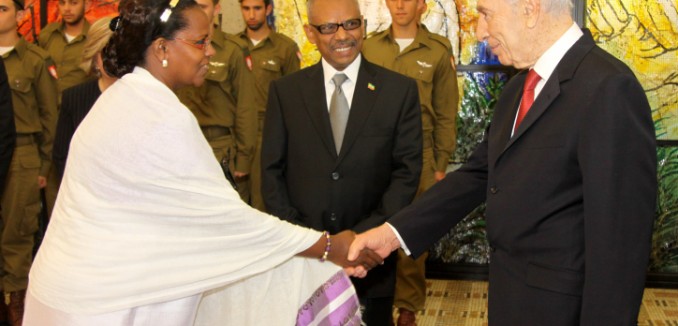Ahead of Prime Minister Benjamin Netanyahu’s historic visit to Sub-Saharan Africa next month, Ethiopia’s ambassador to Israel expressed support for the Jewish state and its expanding ties on the African continent, The Jerusalem Post reported Saturday.
Helawe Yosef Mengistu told the Post that African countries are turning to Israel for help in combating both poverty and terrorist threats. Ethiopia is threatened by the al-Qaeda-allied terrorist group al-Shabaab, which is backed by Ethiopia’s neighbor Eritrea. However, the ambassador stressed that counter-terrorism is not the only basis for ties between the two nations.
“Israel is a very important country for Africa,” he said, and it “has proven itself in transforming the lives of its citizens. These are people that have really risen from the ashes. It is a country that could be a model for others, for people striving to get out of backwardness.”
“Why do people want to isolate a country that is significant in contributing to human development?” he asked rhetorically.
Helawe added that while it is important that Israel and the Palestinians reach a peace agreement, the conflict will not be on the agenda when Netanyahu visits Africa, as discussions will instead focus on “progress in science, in agriculture and education.” The African nations will also want to know more about Israel’s “experience in maintaining peace and security.”
Since the overthrow of dictator Haile Mariam Mengistu in 1991, Ethiopia has experienced rapid growth. The nation now has a total of half a million students in 35 universities, whereas it had just two universities 25 years ago. Israeli scientific and technical knowledge could offer a boost to these institutions, Helawe said.
Helawe added that he would like to see Israel increase the number agricultural projects its Foreign Ministry operates in Ethiopia, which currently stands at four.
While Israel has diplomatic relations with 41 African countries and embassies in 11 of them, it seeks to attain observer status in the African Union. Israel was previously an observer member of the Organization of African Unity, but was prevented from assuming the same status by then-Libyan dictator Muammar Gaddafi when the OAU was dissolved and replaced by the AU.
During Netanyahu’s trip to Uganda, Kenya, Rwanda, and Ethiopia next month, the prime minister plans to commemorate the 40th anniversary the hostage rescue at Uganda’s Entebbe airport. He will be the first Israeli prime minister to visit Sub-Saharan Africa since Yitzhak Shamir visited Togo, Cameroon, Liberia, and the Ivory Coast in 1987.
On a state visit to Israel in February of this year, Kenyan Foreign Minister Amina Mohamed said that most African nations see Israel as a “very close friend.”
In recent years, Israel has been strengthening alliances and establishing ties with nations it hadn’t previously engaged with diplomatically. Israel’s improved diplomatic relations with African nations may be a reflection of its growing international acceptance.
[Photo: Flash90 ]




